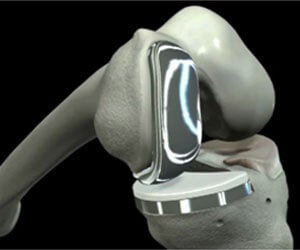
Like the treads on car tires, the all important cartilage within our knees is slowly wearing down. By the age of 65, in fact, nearly 50 percent of us are likely to suffer from a painful degeneration of this cartilage called osteoarthritis. It’s estimated that one in eight of us will suffer so badly that we will require a partial or full knee replacement via surgery within our lifetimes. As barbaric as it may sound to replace part of your knee with artificial components, a privately-held company named ConforMIS has pioneered a technology to produce custom fit, 3D implants using patient CT scans to resurface bone and minimize the amount of tissue cut out. ConforMIS is trailblazing a revolutionary trend in medicine in which medical devices are tailored precisely to the individual patient, reducing surgery times, speeding up recovery, and improving patient satisfaction. Suddenly becoming cybernetic doesn’t sound so bad.
About half a million knee replacement surgeries are currently conducted in the US every year and that number is expected to rise above three million in the next 15 years. Current implants require a number of cuts to the femur and/or tibia to fit the device. Additionally, many of the products that are currently on the market are off-the-shelf devices that come in a few sizes, so surgeons have to slice off even more bone in order to get them to fit. This can lead to long surgeries and increase the discomfort of recovery as well as the time it takes to get back to normal, usually six to eight weeks. While some knee replacements can last 20 years without noticeable wear, patients that need another replacement may have difficulty because they’ve already had a significant amount of bone removed. This is expected to be a growing problem as the average age that patients are seeking knee replacements is decreasing and people are staying active later in life.
As crowded as this multibillion dollar market is, ConforMIS started up in 2004 to take a fresh approach to knee replacement surgery by custom tailoring surgical tools and implants using patient MRI and CT scans. The result is phenomenal: scans of the patient’s leg are sent to ConforMIS for analysis, and just six weeks later a 3D custom-fit implant is created that precisely fits the patient’s anatomy. A future in which we can trick out our bodies is here. The company’s attitude toward knee surgery is even reflected in their name, where “MIS” is short for “Minimally Invasive Surgery.” Over the past seven years, they’ve garnered $80 million in funding and launched two products for partial knee replacements, the iUni and iDuo, and last month, they received FDA clearance to release their total knee replacement, dubbed the iTotal.
The key to developing patient-specific implants is using personalized imaging data, and toward this end, ConforMIS developed their iFit technology, where the “i” stands for “individualized. This software takes the CT data of the patient’s knee, hip and ankle to create models that account for the unique anatomy of the patient’s entire leg. These models are used to create both the implants and the tools to install them. These tools, called jigs, are the exact same shape as the implants, so they align perfectly to the patient’s knee, but they also have placement and cutting guides that allow the surgeon to make precise cuts to remove minimal amount of bone. With these tools, inserting the implant is a bit like snapping a Lego piece into position exactly where it belongs, resulting in much less manual effort and hence less errors from the surgeon.
Should an orthopedic surgeon determine that a ConforMIS product is a good solution to a patient’s knee problems, they’ll send the patient in to have X-ray tomography of the affected knee. These CT scans are then sent to ConforMIS who manufacture the personalized implants and instrumentation and ship them back to the surgeon when ready. Once the surgeon has installed the implants, the patient goes through all the normal recovery procedures for knee surgery, although surgeons report that with the ConforMIS products, some patients are walking around the next day and are released quickly. Cost-wise, custom-made implants are twice as expensive to manufacture, but ConforMIS does not have to maintain the same massive inventory as competitors, so they can offer the implants at comparable prices to other knee replacement devices.
It’s no surprise that the potential to use this technology in other joints is being developed, as ConforMIS has acquired patents for the hip and ankle as well as the spine. The company values the feedback from surgeons and patients acquired through clinical trials, which has led to the launch of second generation devices last year. Still, they are in an ideal position to provide an increasing number of options for people seeking replacement solutions that are customized to their individual bodies. And who knows what other ways 3D image-to-implant technology is going to transform medicine? We’ve recently reported another success story about a similar custom-fit mesh device designed by an engineer to fit around his own aorta. These stories bode well for the emerging era of personalized medicine, promising a future in which the one-size-fits-all approach to healthcare can be put to rest.
[Sources: Annals of Internal Medicine, CDC, ConforMIS, NEJM, OrthoTec]


